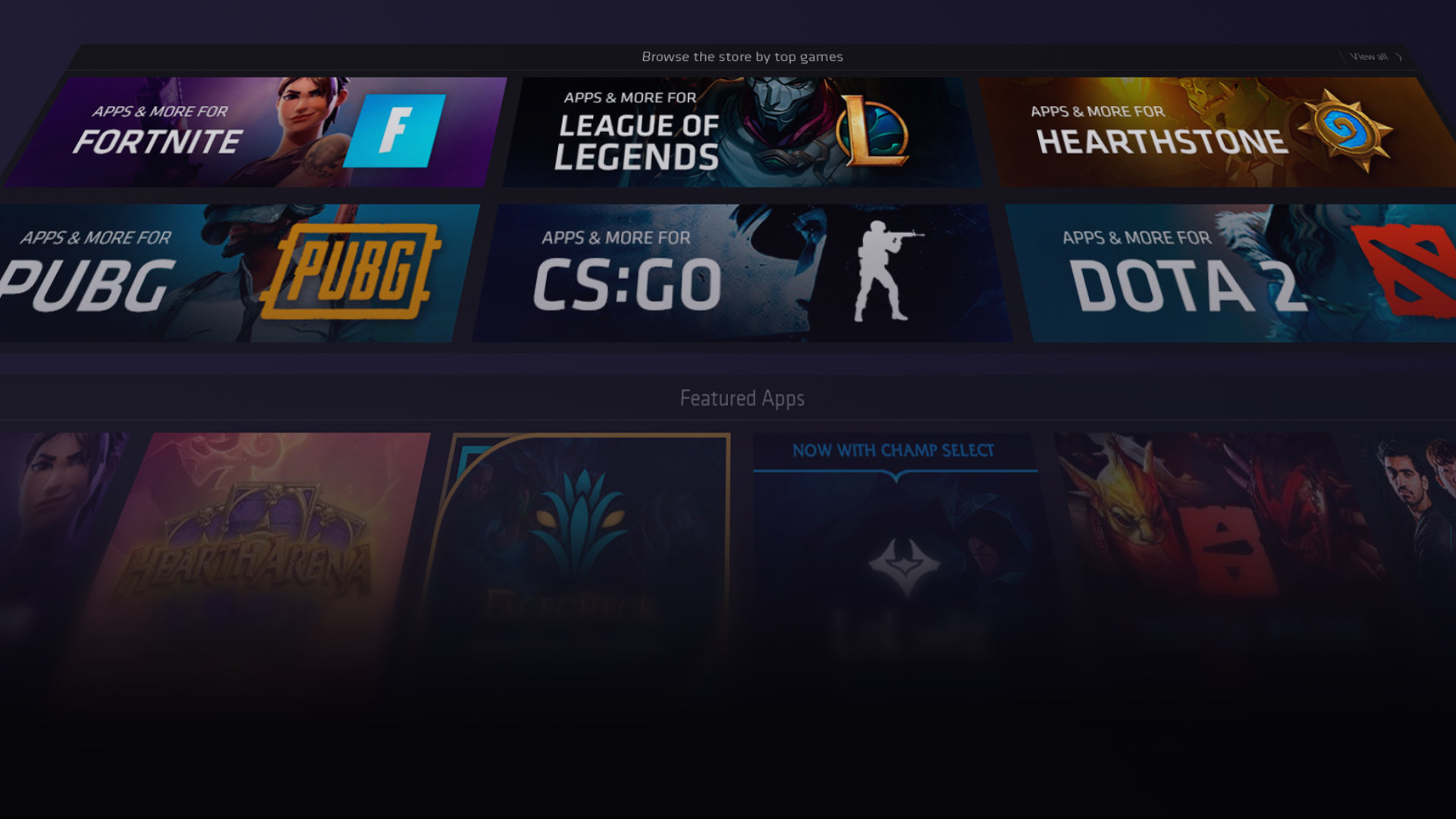Introduction
The world of online gaming has witnessed rapid advancements and innovations in recent years. As technology continues to evolve, so does the gaming industry. From virtual reality to artificial intelligence, these developments have revolutionized the way we play and experience games. Whether you’re a hardcore gamer or someone who enjoys casual gaming sessions, the upcoming developments in online gaming are sure to enthrall and engage players like never before.
With the rising popularity of online gaming, developers are constantly pushing the boundaries to create new and immersive gaming experiences. These developments not only enhance the graphics and gameplay but also offer new ways to connect with fellow gamers and participate in competitive tournaments on a global scale.
In this article, we will explore some of the exciting developments in online gaming that are set to shape the future of the industry. From the advent of virtual reality and augmented reality to the rise of eSports and the integration of artificial intelligence, let’s delve into the next frontier of online gaming.
Buckle up and get ready to embark on a thrilling journey into the world of online gaming!
Virtual Reality in Gaming
Virtual reality (VR) has emerged as a game-changer in the gaming industry, allowing players to immerse themselves in virtual worlds like never before. By wearing a VR headset, gamers can step inside the game and experience a fully interactive and three-dimensional environment.
With VR, players can have a 360-degree view of the game world, giving them a heightened sense of realism and immersion. Whether it’s exploring breathtaking landscapes, engaging in intense combat, or solving intricate puzzles, VR takes gaming to a whole new level.
One of the key advantages of VR in gaming is the ability to provide an unparalleled sense of presence. As players move their heads and interact with the virtual environment, they feel as if they are truly part of the game. This level of immersion can evoke strong emotions and make gaming experiences more memorable and captivating.
Furthermore, VR gaming opens up exciting opportunities for social interaction. Players can join virtual multiplayer games and communicate with others using voice chat or hand gestures. This creates a more dynamic and social gaming experience, bridging the gap between virtual and real-world interactions.
Although VR technology is still evolving, it has already garnered a dedicated fan base and a growing library of VR games. As the technology becomes more accessible and affordable, we can expect to see even more immersive and compelling VR experiences in the future.
Additionally, the integration of VR with other gaming peripherals, such as motion controllers and haptic feedback devices, adds another layer of realism to the gaming experience. Players can physically interact with virtual objects and feel tactile sensations, further blurring the boundaries between the real and virtual worlds.
Virtual reality is poised to revolutionize how we play and experience games. It offers a level of immersion and interactivity that was previously unimaginable. As technology continues to advance, VR will continue to shape the future of online gaming, providing gamers with thrilling and unforgettable adventures.
Augmented Reality in Gaming
While virtual reality transports players to entirely virtual worlds, augmented reality (AR) brings virtual elements into the real world. With the help of smartphones or AR headsets, gamers can overlay digital objects and characters onto their physical surroundings, creating a blended experience of the real and virtual worlds.
Augmented reality gaming has gained immense popularity with the release of games like Pokémon Go, which allows players to catch virtual creatures in real-world locations. This fusion of virtual and real-world elements not only adds a layer of excitement but also encourages players to explore their surroundings in search of in-game treasures and challenges.
One of the advantages of augmented reality in gaming is its accessibility. Many AR games can be played using smartphones, eliminating the need for expensive VR headsets or specialized equipment. This makes AR gaming more inclusive and appealing to a wider audience.
AR also facilitates social interaction and collaboration by allowing players to see and interact with virtual characters and objects together in the same real-world environment. This opens up possibilities for shared gaming experiences and cooperative gameplay, making AR gaming a social and engaging activity.
Moreover, augmented reality is not limited to outdoor experiences. With advancements in AR technology, indoor AR gaming is also gaining traction. Players can transform their living rooms or any other indoor space into a virtual battleground, where they can battle monsters, solve puzzles, or participate in virtual sports.
As AR technology continues to evolve, we can expect more sophisticated and immersive AR gaming experiences. Developers are exploring ways to enhance AR visuals, improve object recognition, and integrate more advanced features like real-time multiplayer functionality.
Augmented reality in gaming has the potential to redefine how we interact with and experience games. It seamlessly blends virtual and real-world elements, creating unique and captivating gameplay experiences. With the growing popularity of AR, we are likely to see more innovative and interactive AR games in the near future.
Cloud Gaming
Cloud gaming is a monumental shift in the way games are played and accessed. Unlike traditional gaming, where the game is processed and rendered on the user’s device, cloud gaming allows players to stream games directly from remote servers. This means that gamers no longer need high-performance hardware to enjoy graphically demanding games.
One of the key advantages of cloud gaming is its accessibility. Players can access their favorite games on a variety of devices, including smartphones, tablets, smart TVs, and computers, without having to download or install the game locally. This eliminates the need for expensive gaming consoles or PCs, making gaming more affordable and accessible to a wider audience.
Cloud gaming also offers the advantage of instant access to a vast library of games. With a stable internet connection, players can stream games on-demand, eliminating the need for physical copies or lengthy downloads. This allows gamers to jump into their favorite games quickly and easily.
Another benefit of cloud gaming is the ability to seamlessly switch devices without losing progress. Players can start a game on one device and continue playing on another without any interruptions, thanks to cloud-based save data synchronization.
Moreover, cloud gaming allows game developers to push the boundaries of graphics and gameplay. With the significant processing power available in remote servers, games can be rendered at higher resolutions and frame rates, delivering stunning visuals and smoother gameplay.
Cloud gaming also opens up possibilities for cross-platform play, enabling gamers to play together regardless of the device they are using. This bridges the gap between different gaming platforms and fosters a more inclusive and connected gaming community.
While cloud gaming has its advantages, it also relies heavily on a stable and fast internet connection. Any network lag or latency issues can impact the gaming experience, causing delays or input lag. Additionally, subscription costs and potential data caps imposed by internet service providers can be limiting factors for some players.
Overall, cloud gaming presents an exciting future for the gaming industry. It brings accessibility, flexibility, and convenience to gamers, allowing them to enjoy high-quality gaming experiences without the need for expensive hardware. With continuous advancements in technology and infrastructure, we can expect cloud gaming to become even more prominent and widespread in the coming years.
Mobile Gaming
Mobile gaming has experienced exponential growth in recent years, thanks to the widespread availability of smartphones and tablets. With powerful hardware and high-resolution displays, mobile devices have become capable gaming platforms that offer immersive gameplay experiences on the go.
One of the key advantages of mobile gaming is its convenience. Players can carry their gaming device in their pocket and enjoy games anytime, anywhere. Whether it’s a quick match during a lunch break or a longer gaming session during a commute, mobile gaming allows for flexible and on-the-go entertainment.
Mobile games come in a variety of genres, catering to a wide range of player preferences. From casual puzzle games to graphically stunning multiplayer shooters, there is a mobile game for everyone. The availability of a diverse selection of games ensures that players can find something they enjoy, no matter their gaming preferences.
Furthermore, mobile gaming has evolved beyond traditional single-player experiences. The rise of multiplayer mobile games has brought people together, fostering new social connections and competitive gaming communities. Whether it’s teaming up with friends or competing against players from around the world, mobile gaming offers a platform for social interaction and friendly competition.
In-app purchases and free-to-play models have become integral parts of the mobile gaming ecosystem. While some games are free to download and play, developers offer additional content or enhancements that can be purchased within the game. This model allows players to enjoy games at no cost and choose to invest in the game if they wish to enhance their gaming experience.
Mobile gaming has also witnessed significant advancements in graphics and gameplay. Developers are constantly pushing the boundaries to deliver visually stunning and immersive experiences on mobile devices. From intricate game worlds to realistic character models, mobile games have become visually impressive and comparable to console and PC gaming.
Moreover, mobile gaming is not limited to smartphones and tablets. With the increasing popularity of gaming-centric accessories like Bluetooth controllers and gaming grips, players can enhance their gaming experience and have more precise control over their games on mobile devices.
The future of mobile gaming looks promising, with continual technological advancements and the integration of new features. As smartphones and tablets become more powerful and versatile, we can expect even more innovative and immersive mobile gaming experiences that rival traditional gaming platforms.
Cross-platform Gaming
Cross-platform gaming is a growing trend that allows players to enjoy games with others regardless of the gaming platform they are using. This means that players on different devices, such as PC, console, and mobile, can play together in the same game world, fostering a more inclusive and connected gaming community.
One of the key benefits of cross-platform gaming is the ability to play with friends who may have different gaming preferences or devices. Whether it’s teaming up for cooperative gameplay or competing against each other, cross-platform gaming eliminates barriers and allows players to enjoy games together, regardless of the platform they play on.
Cross-platform gaming also extends the lifespan of multiplayer games. With a larger player base, matchmaking times are reduced, ensuring that players can find opponents or teammates more quickly. This creates a more dynamic and engaging multiplayer experience that is not limited by the player’s choice of gaming platform.
Furthermore, cross-platform gaming promotes fair competition. Players on different devices can compete against each other, leveling the playing field and putting skills to the test. It removes the advantage one platform may have over another, ensuring that the focus is on player skill and strategy rather than the device they are using.
Another advantage of cross-platform gaming is the ability to access the same game and progress seamlessly across multiple devices. Players can start a game on their PC, continue playing on their console, and then switch to their mobile device without losing their progress. This flexibility adds convenience and allows players to game wherever and whenever they want.
Developers are recognizing the value of cross-platform gaming and are actively implementing it in their games. Games like Fortnite and Minecraft have paved the way for cross-platform play, proving that it is both technically feasible and highly desired by players. As a result, more and more games are offering cross-platform functionality, further enhancing the gaming experience and expanding the player base.
However, there are some challenges to overcome in cross-platform gaming, such as maintaining fair competition and ensuring compatibility between different platforms. Additionally, account management and data synchronization across platforms need to be seamless and user-friendly.
As gaming technology continues to advance and the demand for cross-platform gaming grows, we can expect to see more games embracing this trend. Cross-platform gaming is breaking down barriers and connecting players from different gaming platforms, creating a more collaborative and unified gaming community.
eSports
eSports, short for electronic sports, has emerged as a prominent and rapidly growing sector within the gaming industry. It refers to competitive video gaming, where professional players or teams compete against each other in various multiplayer games. eSports events are often held in large arenas or broadcasted online, attracting millions of viewers from around the world.
One of the key factors driving the popularity of eSports is its accessibility. With the rise of online gaming and streaming platforms, anyone with a gaming setup and an internet connection can participate or watch eSports competitions. This has allowed talented players to showcase their skills and has opened up avenues for aspiring gamers to pursue careers in professional eSports.
eSports has also gained recognition and support from major organizations and sponsors. Tournaments offer substantial prize pools, and top eSports teams have secured sponsorship deals with renowned brands. This level of financial backing has professionalized the eSports industry, attracting top talent and contributing to its growth and success.
One of the remarkable aspects of eSports is its global appeal. eSports events and competitions bring together players and viewers from diverse backgrounds, transcending geographical boundaries. The competitive nature of eSports has fostered a sense of community and camaraderie among players and fans, creating a vibrant and passionate eSports culture.
Streaming platforms like Twitch and YouTube have played a crucial role in the rise of eSports by providing a platform for live broadcasts and interactions. Viewers can watch their favorite players and teams compete in real-time, offering a dynamic and engaging spectator experience. This has led to the development of dedicated eSports communities and fan bases, further fueling the growth of the industry.
eSports has also garnered attention from traditional sports organizations and media. Major sports leagues and networks have started investing in eSports and broadcasting events on television and online platforms. This crossover has helped legitimize eSports as a recognized and respected form of competitive entertainment.
With the increasing popularity and commercial viability of eSports, more game developers are designing games specifically with competitive eSports elements in mind. These games focus on balance, skill-based gameplay, and spectator-friendly features, creating a competitive environment that is conducive to eSports competitions.
As eSports continues to grow, it presents tremendous opportunities for players, teams, sponsors, and fans alike. The industry is predicted to reach even greater heights, with larger prize pools, increased viewership, and more recognition on a global scale. eSports has become more than just a niche interest; it is a thriving and influential sector that is shaping the future of both gaming and entertainment as a whole.
Artificial Intelligence in Gaming
Artificial Intelligence (AI) has transformed various industries, and gaming is no exception. In recent years, AI has been integrated into games to enhance the gameplay experience, providing more immersive and intelligent interactions for players.
One of the key applications of AI in gaming is in non-player characters (NPCs) or computer-controlled entities. AI algorithms are used to create NPCs that exhibit realistic behaviors, making them more challenging and dynamic opponents for players. NPCs can adapt to different situations, learn from player behavior, and make intelligent decisions, adding depth and complexity to gameplay.
AI has also made significant strides in creating more realistic and believable virtual worlds. NPCs and environments can now be generated procedurally, reducing the need for manual content creation. This allows game developers to create vast and diverse game worlds that feel alive and responsive to player actions.
Another exciting aspect of AI in gaming is its ability to power realistic physics simulations. AI algorithms can calculate and simulate complex physics interactions, resulting in more realistic and immersive gameplay. This is particularly evident in sports and racing games, where AI-driven physics engines contribute to the authenticity of the gaming experience.
AI is also being utilized in game analytics and player behavior prediction. Through machine learning algorithms, AI can analyze player data and patterns to provide personalized gameplay experiences. This can come in the form of adaptive difficulty levels, tailored in-game recommendations, or customized content generation.
Furthermore, AI is being used to enhance gaming experiences through speech recognition and natural language processing. Voice assistants and chatbots within games can understand and respond to player commands and inquiries, creating more interactive and immersive gameplay interactions.
While AI has brought numerous advancements to gaming, there are also ethical considerations. Developers must ensure that AI algorithms are fair, unbiased, and respectful of player privacy. Additionally, AI-driven NPCs should not become overwhelmingly powerful or unpredictable, leading to frustrating gameplay experiences.
Looking forward, the integration of AI in gaming is poised to continue its rapid growth. As AI technology evolves, we can expect even more intelligent and adaptive game experiences. The potential applications of AI in gaming span across genres, from advanced enemy AI to more immersive storytelling and dynamic game world generation.
Artificial Intelligence is revolutionizing gaming, making it more engaging, immersive, and intelligent. As developers embrace AI algorithms and techniques, players can look forward to more realistic and dynamic gaming experiences that push the boundaries of possibility.
Blockchain in Gaming
Blockchain technology has gained attention for its potential to revolutionize various industries, and gaming is no exception. Blockchain is a decentralized and transparent ledger system that enables secure and immutable transactions. In the gaming industry, blockchain is being utilized to introduce new possibilities and improve aspects such as ownership, security, and in-game economies.
One of the key advantages of blockchain in gaming is the concept of true ownership. Traditionally, game assets and virtual items are owned and controlled by game developers or publishers. However, blockchain technology enables players to have true ownership and control over their in-game assets. These assets are stored on the blockchain, allowing players to sell, trade, or transfer them outside of the game ecosystem.
Furthermore, blockchain has the potential to bring transparency and security to in-game transactions. By leveraging smart contracts, which are self-executing and tamper-proof agreements, blockchain ensures that transactions within the game are secure, verifiable, and fraud-resistant. This eliminates the risk of scams or fraudulent activities associated with traditional centralized gaming platforms.
The use of blockchain also enables the creation of decentralized in-game economies. In-game currencies and digital assets can be tokenized on the blockchain, allowing for more transparent and dynamic player-driven economies. This fosters a sense of community and empowerment among players, as they have greater control over the value and management of their in-game assets.
Blockchain technology also has the potential to address issues of cheating and hacking in gaming. Since blockchain transactions are recorded and verified on a decentralized network, it becomes much more difficult for hackers to manipulate game data or engage in unfair practices. This enhances the integrity and fairness of online multiplayer games.
Moreover, blockchain technology can facilitate cross-platform functionality and interoperability. As game assets and data are stored on the blockchain, players can seamlessly transfer their progress, achievements, and in-game items across different gaming platforms. This breaks down barriers and allows for a more seamless and connected gaming experience.
While blockchain in gaming holds immense potential, there are challenges to overcome. The scalability and processing speed of blockchain networks need to be addressed to accommodate the high transaction volumes of gaming environments. Additionally, the user experience and adoption of blockchain technology within games need to be streamlined and user-friendly to attract a broader audience.
Despite these challenges, the integration of blockchain in gaming is an exciting development that opens up new possibilities for players and developers. The concept of true ownership, secure transactions, player-driven economies, and enhanced fairness has the potential to revolutionize the gaming industry and empower players like never before.
Online Gaming Communities
Online gaming communities have become an integral part of the gaming experience, providing players with a platform to connect, interact, and collaborate with like-minded individuals from around the world. These communities foster a sense of belonging, camaraderie, and shared enthusiasm for gaming.
One of the primary benefits of online gaming communities is the opportunity for social interaction. Players can join forums, discussion boards, or social media groups dedicated to specific games or gaming genres. These platforms allow players to share their experiences, strategies, and tips, as well as engage in friendly banter and discussions about their favorite games.
Online gaming communities also provide a space for players to form friendships and create long-lasting relationships. Through cooperative multiplayer games or competitive eSports events, players can team up with or compete against others, fostering bonds and building a sense of teamwork or healthy competition.
Moreover, online gaming communities may organize offline events, such as LAN parties or gaming conventions, where gamers can come together in person to meet, play games, and share their passion for gaming. These gatherings create opportunities for players to establish real-world connections and strengthen the sense of community.
In addition to social interaction, online gaming communities offer valuable resources and support for players. Newcomers can find guidance, tutorials, and tips from veteran players within these communities, helping them to improve their skills and understanding of the game. Likewise, players facing challenges or seeking advice can turn to the community for solutions and guidance.
Furthermore, online gaming communities can be a source of inspiration and creativity. Many communities have platforms where players can showcase their fan art, fan-made videos, or game modifications. This allows individuals to express their creativity, gain recognition, and contribute to the overall gaming culture.
However, it is worth noting that online gaming communities are not without their challenges. Toxic behavior, harassment, and trolling can occur within these communities, negatively impacting the experience for many players. It is essential for community moderators and game developers to implement measures to foster a safe and inclusive environment for all participants.
The growth and popularity of online gaming communities continue to thrive due to the sense of belonging, social interaction, and shared passion they provide. As gaming continues to evolve, these communities will play a crucial role in connecting players, fostering friendships, and enhancing the overall gaming experience.
Conclusion
The world of online gaming is evolving at an unprecedented pace, driven by technological advancements and the changing demands of players. From virtual reality and augmented reality to cloud gaming and AI integration, the future of online gaming promises to be an exciting and immersive experience for players of all backgrounds and interests.
Virtual reality has revolutionized gaming by enabling players to experience fully immersive virtual worlds. Augmented reality has brought virtual elements into the real world, creating unique and interactive gaming experiences. Cloud gaming has made gaming more accessible and flexible, allowing players to enjoy high-quality games without the need for expensive hardware. Mobile gaming has given players the freedom to enjoy games on the go, while cross-platform gaming has connected players regardless of their preferred gaming platform.
eSports has established itself as a booming industry, attracting millions of viewers and offering professional opportunities for gamers. Artificial intelligence has introduced intelligent NPCs, realistic physics simulations, and personalized gaming experiences. In the realm of blockchain, true ownership, secure transactions, and player-driven economies are changing the gaming landscape. Lastly, online gaming communities have created spaces for social interaction, support, and creativity.
As the gaming industry continues to innovate, it is crucial to balance technological advancements with a user-centric approach. The goal should be to provide players with immersive and engaging experiences while ensuring inclusivity, fairness, and a safe gaming environment.
In conclusion, online gaming is poised for remarkable growth and transformation. With the integration of cutting-edge technologies, the collaboration of passionate gamers, and the dedication of developers, the future of online gaming holds endless possibilities. It is an exciting time to be a part of this evolving industry, where games are not just a form of entertainment but a gateway to extraordinary experiences, connections, and adventures.

























